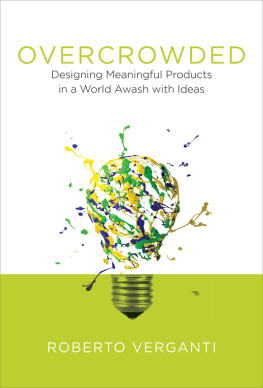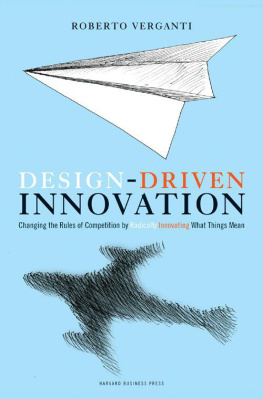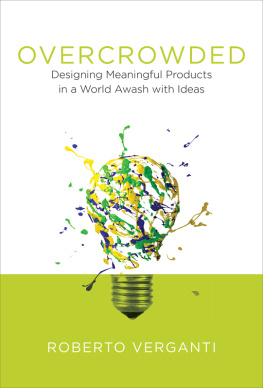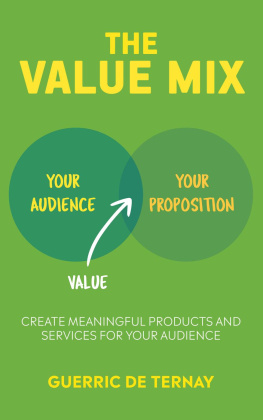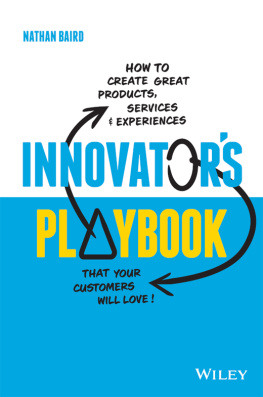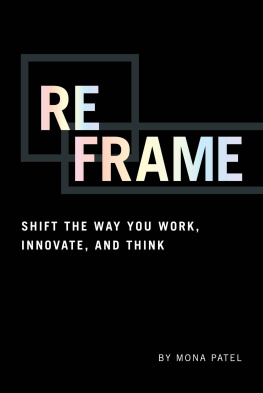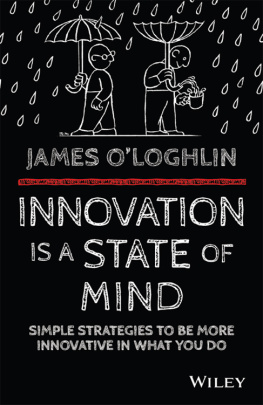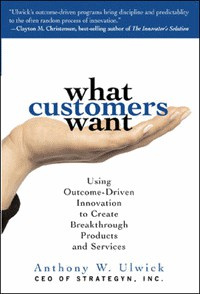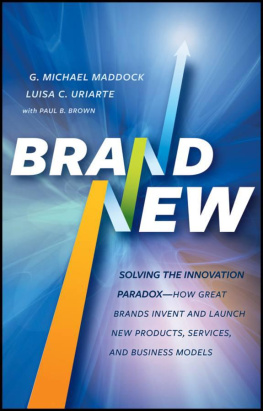Design Thinking, Design Theory
Ken Friedman and Erik Stolterman, editors
Design Things, A. Telier (Thomas Binder, Pelle Ehn, Giorgio De Michelis, Giulio Jacucci, Per Linde, and Ina Wagner), 2011
Chinas Design Revolution, Lorraine Justice, 2012
Adversarial Design, Carl DiSalvo, 2012
The Aesthetics of Imagination in Design, Mads Nygaard Folkmann, 2013
Linkography: Unfolding the Design Process, Gabriela Goldschmidt, 2014
Situated Design Methods, edited by Jesper Simonsen, Connie Svabo, Sara Malou Strandvad, Kristine Samson, Morten Hertzum, and Ole Erik Hansen, 2014
Taking [A]part: Experience-Centered Design and the Politics and Aesthetics of Participation, John McCarthy and Peter Wright, 2015
Design, When Everyone Designs: An Introduction to Design for Social Innovation, Ezio Manzini, 2015
Creating Frames: A New Design Practice for Driving Innovation, Kees Dorst, 2015
Designing Publics, Christopher A. Le Dantec, 2016
Overcrowded: Designing Meaningful Products in a World Awash with Ideas, Roberto Verganti, 2016
FireSigns: A Semiotic Theory for Graphic Design, Steven Skaggs, 2017
Overcrowded
Designing Meaningful Products in a World Awash with Ideas
Roberto Verganti
The MIT Press
Cambridge, Massachusetts
London, England
2016 Massachusetts Institute of Technology
All rights reserved. No part of this book may be reproduced in any form by any electronic or mechanical means (including photocopying, recording, or information storage and retrieval) without permission in writing from the publisher.
This book was set in Stone Serif and Stone Sans by Toppan Best-set Premedia Limited. Printed and bound in the United States of America.
Library of Congress Cataloging-in-Publication Data
Names: Verganti, Roberto, author.
Title: Overcrowded : designing meaningful products in a world awash with ideas / Roberto Verganti.
Description: Cambridge, MA : The MIT Press, [2016] | Series: Design thinking, design theory | Includes bibliographical references and index.
Identifiers: LCCN 2016018208 | ISBN 9780262035361 (hardcover : alk. paper)
eISBN 9780262335812
Subjects: LCSH: New products. | Product design.
Classification: LCC TS170 .V47 2016 | DDC 658.5/752--dc23 LC record available at https://lccn.loc.gov/2016018208
ePub Version 1.0
To
Alessandro
Matilde
Agnese
the gifts of life
A Gift Note
Everyone is a creator of meaning.
We create meaning through the humans we love.
But we also create meaning in the humbleness and responsibility of our everyday work.
Each one of us through our profession
managers, designers, scholars, students, artists, scientists
generates products, services, events that carry meaning to the life of people.
We may bring happiness, relieve pain, open new opportunities.
Beyond our own awareness, each one of us has an impact on the life of others,
through the vision we nurture and the new things we advance.
Early morning. My eyes closed, I feel the warmth of my bed, the kind light of the sunrise seeping through the curtains. The sheets are crisp. My mind is fresh.
The alarm clock sounds. I know there is a train passing by the station in about one hour. My daily commute is waiting for me. But I feel the coziness of the blankets.
Why should I wake up?
Why should I ever wake up with a smile, catch that train and go to my office?
I turn, and I see a book lying on a shelf next to the window. A book on innovation. It has been lounging there for a while, forgotten after I read through it to prepare a class. I ponder what this book would suggest as an answer. It would probably invite me to wake up to solve problems, like many other innovation books that have lain on our desks in the last fifteen years. They offer us an implicit perspective on why we work, why we offer things to others, and why we innovate. Their tacit assumption is that there are problems in the world; people, customers, have needs and problems. We wake up in the morning to help solve those problems better.
Which is good. But maybe there is a more powerful perspective, something more to pull us out from these warm blankets. We wake up to find meaning. That is: there are opportunities in the world; people have a purpose in life. We wake up in the morning to help create things that make more sense, that are more meaningful.
This book is for those of us who see life not as a problem but as an opportunity. Who believe that people are not driven by need but by purpose. That existence is not a solution but a gift.
In short, this is a book about the search for meaning. The search for meaning through innovation.
Meaning for People
Meaning for whom?
First, for the receivers of our creations; for the people who treasure the products and services we offer. When they wake up in the morning, they search for meaning.
People have always searched for meaning. This search is deeply embedded in the history of humanity. Indeed, meaning has been the cynosure of philosophy, of major branches of psychology (logotherapy, in particular), of contemporary sociology. But the search for meaning has never been as relevant as today, when people live in a world awash with ideas, bursting with options. A world where everything is possible and the big question in life is not how? but why?
Yet many innovation theories seem to miss this fundamental perspective of life. They silently propound a picture of life rooted in the last century, a life driven by need. They implicitly suggest that we look at customers as walking sacks of problems to be solved. We have to admit that even if these theories are labeled as user-centered, or human-centered, even if they are technically human, they are deeply inhuman. They treat people as beings, but they dissect what makes these beings humans: the search for meaning.
I do not believe in this.
I have the lucky chance to have three children. When they came into life, I did not mean to create a sack of problems and needs. I did not tell them: Sorry you came into this world, now you have problems to be solved. I celebrated their life. I wished to offer them a gift. The gift of life. An opportunity. Yes, of course people have problems and needs, and our responsibility is to help solve them. But I believe there is much more in life.
If you want to create things that people love, that are meaningful, you will hardly get there just by solving problems. Think about love. Love is one of the feelings in life that carries more meaning, but also more pain. If you want to solve problems, simply avoid falling in love. Problem solving and love really do not get along well together.
Meaning for You
Second, this book is about your own search for meaning. It is about the reason you wake up in the morning and catch that train.
Solving problems requires an aseptic, impersonal attitude; a naive mind, free of judgments, free of preconceptions, free of your personal values. Which is reasonable when you solve someone elses problems. But creating meaning demands much more: it demands that you start from your values, from what you believe in, from your vision of the world. Its like a gift. A person will never fall in love for a gift she simply asks for. The gift needs to come from you, from your own search for meaning. If you do not love it, how could she love it? The search for meaning gives you the chance not only to solve problems, not only to innovate, but to innovate in a direction that
Next page
